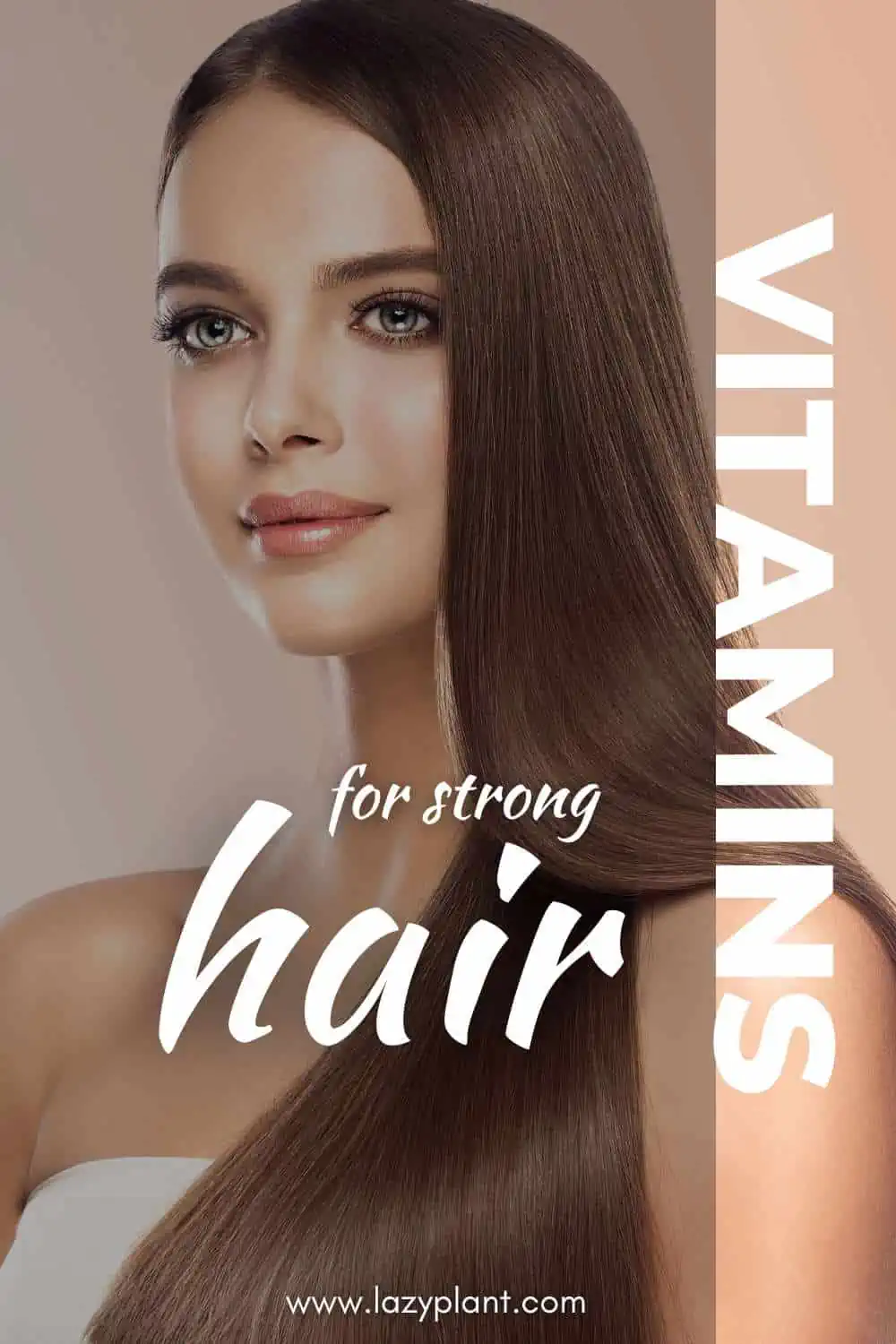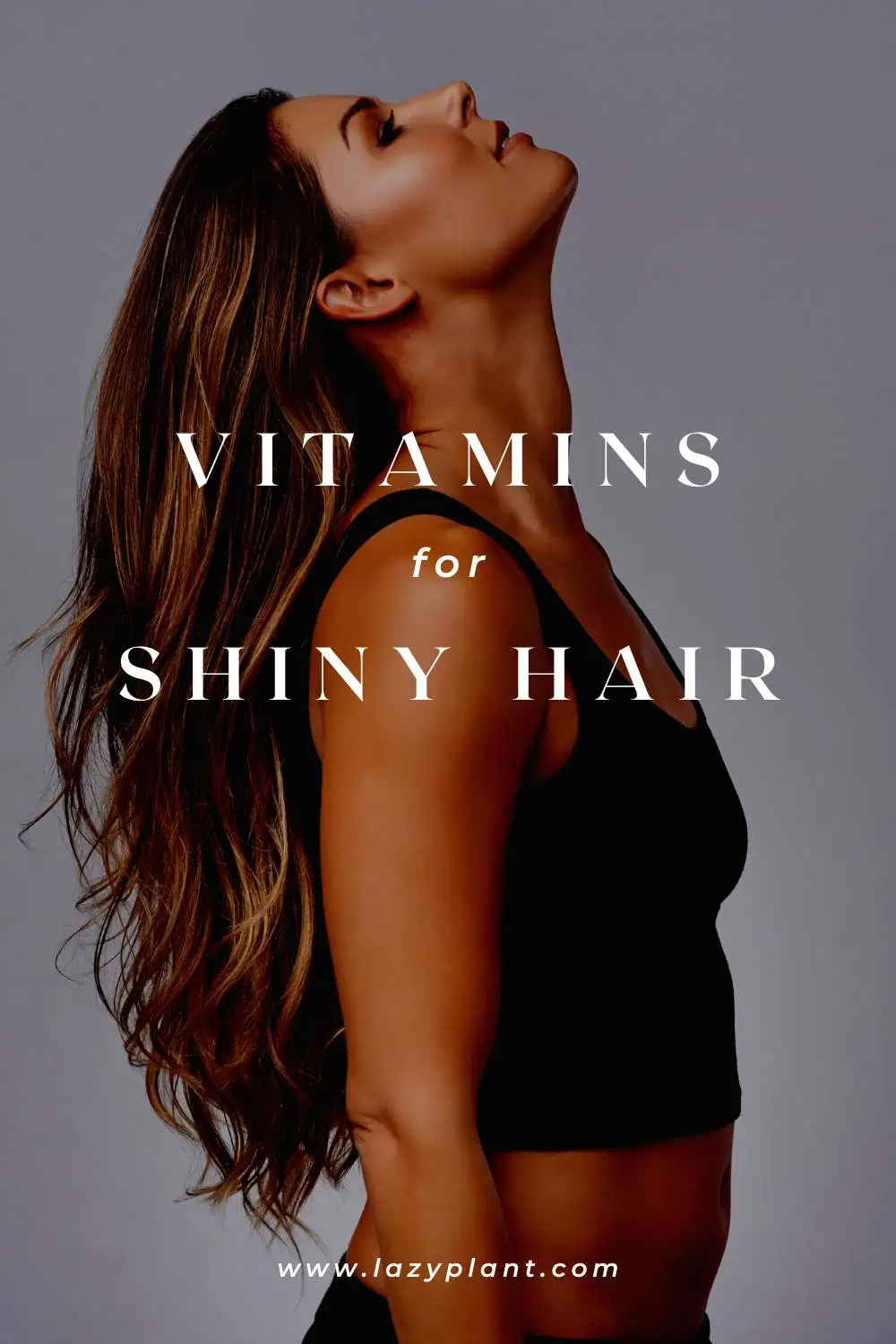One or more nutritional deficiencies can cause fragile hair or hair loss. Key vitamins for healthy hair are vitamins A, C, D, E, and all the B vitamins, as well as zinc and iron.
What causes hair loss?
There are many causes for hair loss. Nutritional deficiencies, illness, infections, medication, emotional & physiological stress, and hormonal imbalances are only a few.
If you lose hair due to nutritional deficiencies, eating foods rich in certain vitamins and minerals can help your hair regrow and thicken.[1]
On the other hand, if your hair falls for another cause, there is no evidence that eating foods high in certain vitamins and minerals can help your hair grow thicker and stronger.
Vitamin A for hair growth
Vitamin A is important for healthy hair, as it’s a vital nutrient for cell growth. After all, hair is the fastest-growing tissue in the human body, second only to bone marrow.
Moreover, vitamin A is a key factor in boosting the natural synthesis of collagen! Collagen is the most abundant protein in the body.
Collagen is important for thick and healthy hair, as it prevents hair follicle damage and protects the skin near the hair roots.
The richest plant-based sources of vitamin A are sweet potatoes, carrots, turnip greens, dandelion greens, moringa powder, spinach, and many more.
B vitamins for preventing hair loss
Studies have shown that vitamins B2, B7, B9 and B12 are important for strong and thick hair.[2]
Hair grows at hair follicles. Hair follicles need lots of nutrients to function properly. Blood vessels supply nutrients and oxygen to hair follicles. Red blood cells, in particular, transfer oxygen to hair follicles, keeping them healthy.

Vitamin B12, in particular, is necessary for the synthesis of red blood cells and healthy blood cells.[3]
Low levels of vitamin B12 may cause fragile hair or even hair loss, as blood cells can’t supply enough nutrients to hair follicles. So, they can’t grow hair effectively, or they grow fragile hair, leading eventually to hair loss.
Vitamin B12 and folate deficiency can also cause premature graying of hair.[4]
Do I need supplements?
Plants don’t contain vitamin B12. Only fortified foods and foods from animal sources, such as chicken, fish, milk, dairy, and eggs are rich in vitamin B12.
Therefore, many people would benefit from taking vitamin B12 supplements. A weekly vitamin B12 dosage of 1,000 mcg is enough in most cases.
If you have low levels of vitamin B12, supplements may have a beneficial effect on your hair. But, if you have high levels of vitamin B12 or any other B vitamin, supplements won’t help you further.
You can find a wide variety of vitamin B12 supplements on iHerb.
Vitamin C for hair growth and thickness
Another vital vitamin for strong and thick hair is vitamin C.
Firstly, vitamin C is essential for iron absorption. Iron deficiency has been linked to hair loss!
Moreover, vitamin C is important for the natural production of collagen.
In addition, vitamin C is a powerful antioxidant. Antioxidants fight oxidative stress. Oxidative stress has been linked to hair loss.
According to studies, people with hair loss probably suffer from oxidative stress in the scalp. Eating foods rich in antioxidants is the best defense against free radicals. Fruits, vegetables, and herbs are the best sources of antioxidants.[5]
Furthermore, vitamin C regenerates other antioxidants within the body, such as vitamin E. Vitamin E is also beneficial for the skin and hair.[6]
Causes of oxidative stress
Smoke, pollution, toxins, stress, sunlight, and poor diet can cause excess of production of free radicals, leading to oxidative stress.
Hair is very sensitive to UV irradiation. Exposure to dangerous sunlight has been associated with:
- loss of hair protein
- hair follicles damage
- bad hair color

Sunlight produces free radicals that have a negative impact on hair proteins. Keratin, in particular. Actually, the sunlight can penetrate several layers of the hair.[7]
Even smoking can cause thin and brittle hair or premature hair loss. It increases oxidative stress and DNA damage. Smokers need much higher doses of vitamin C per day. They need 50% more vitamin C than non-smokers.
Vitamin C may prevent gray hair
Genetics are the main reason for hair graying. But, oxidative stress can contribute to gray hair as well. Vitamin C, as a powerful antioxidant, could neutralize free radicals, preventing premature hair graying, and protecting the natural color of your hair.
The role of Vitamin D in hair loss
According to many studies, vitamin D deficiency has been linked to an increased risk of hair loss. Participants with insufficient amounts of vitamin D had higher chances of losing their hair![8,9,10]
Vitamin deficiency is pretty common, though. Most people get low amounts of vitamin D from their diet. Only certain fish, such as salmon, trout, mackerel, tuna, and eggs contain high amounts of vitamin D.
The best way to take adequate amounts of vitamin D is from dietary supplements. You’ll find a wide variety of vitamin D supplements on iHerb.
Vitamin E stimulates hair growth
According to studies, people with fragile hair have significantly lower levels of vitamin E.
Vitamin E may prevent hair loss, as it’s one of the most powerful antioxidants!
Moreover, vitamin E can stimulate hair growth. People suffering from hair loss, started growing back hair, after the application of vitamin E.[11]
One of the richest foods in vitamin E is almonds.
Selenium fights oxidative stress in the scalp
Selenium is an essential trace element. It’s vital for the synthesis of glutathione peroxidase; a powerful antioxidant enzyme. Selenium protects your hair as it has potent antioxidant actions.[12]
The richest food in selenium is Brazil nut. Just a nut provides more selenium than the recommended daily intake.
Omega-3s promote hair growth
According to studies, eating foods rich in omega-3 fatty acids is also good for your hair. Participants had thicker hair after 6 months, after taking omega-3 supplements! Actually, there are only a few foods high in omega-3s.
Iron deficiency may cause hair loss
Iron deficiency is a key reason for hair loss and fragile hair as well. Actually, it’s the most common nutritional deficiency in the world.
In most cases, hair loss due to iron deficiency isn’t permanent. Treating iron deficiency could regrow strong hair. Your hair may need a couple of months to regrow.
Furthermore, iron is important for the natural synthesis of collagen; a key protein for hair structure.
Moreover, consuming lots of foods high in iron may protect the natural color of your hair.
Do I need iron supplements for thick hair?
You should check your ferritin levels and consult your healthcare provider before taking any supplement. You must be sure that you’re indeed deficient in iron. If you aren’t deficient in iron, you could prevent hair loss by taking the proper supplement.
Women need much higher doses of iron per day. Iron deficiency is pretty common in women. Healthy women with serum ferritin levels below 30 ng/mL have a significantly higher risk of hair loss. Below these levels, iron supplementation could be beneficial for hair growth.[13,14]
Beans (e.g. lentils), seeds (e.g. pumpkin seeds), nuts (e.g. walnuts), and certain fruits (e.g. dates) are good sources of iron.
In many cases, iron supplementation is highly recommended, though.
Zinc is necessary for hair growth
Zinc is the second most abundant trace metal in the human body after iron!
Zinc is necessary for healthy hair. According to studies, hair loss has been associated with low serum zinc levels. Zinc affects hair follicle cycling and helps hair grow.[15]
Most noteworthy, scientists found that we should have zinc plasma levels above 10 µmol/L in order to increase hair density and hair diameter. Lower zinc levels may impair other traditional treatments for hair loss, as well. The normal plasma range is 9–20 µmol/L.[16]
Moreover, zinc deficiency may be a reason for gray hair.[17]
There are plenty of foods high in zinc.
Foods for strong & thick hair

Moringa
Moringa powder is a good dietary source of many of the key nutrients that stimulate hair growth.
Firstly, moringa powder is particularly rich in vitamin A. It has about 28.5 mg of beta-carotene per 100g or 1 mg per 2 tsp We need about 3-6 mg of beta-carotene a day.[18,19]
Actually, moringa powder is one of the richest foods in beta-carotene.
In addition, moringa powder may protect your healthy hair, as it’s an excellent source of vitamin E. It contains about 77 mg of vitamin E. 2 teaspoons of moringa powder contain about 3.1 mg of vitamin E or 20% of the Daily Value.[20]
Also, moringa powder is rich in iron. 2 teaspoons contain about 2 mg of iron or 11% DV.
You’ll find a wide variety of moringa supplements (powders or capsules) on iHerb.
Walnuts
Walnuts strengthen your hair because they’re excellent dietary sources of biotin, selenium, vitamin E, and omega-3 fatty acids.
Biotin is one of the most important vitamins for healthy, thick, and strong hair that grows fast. According to a study, published in The Journal of Clinical and Aesthetic Dermatology, biotin can safely and effectively promote significant hair growth in women with temporary hair thinning.[21]
The recommended daily intake of biotin is 30 mcg. Just a handful of walnuts (7 walnuts) contains about 0.7 mcg of biotin. This amount is 2.3% of the Daily Value. You can eat 14 walnuts to get almost 5% of the DV.
Only in cases of acute biotin deficiency, getting high doses of biotin from dietary supplements could be beneficial, though. Healthy people who follow a well-balanced diet are rather unlikely to be deficient in biotin.[22]
Also, a handful provides 9% DV of selenium and 4% DV of vitamin E.
Besides nutritional deficiencies, infections, as well as emotional and physiological stress are common causes of hair loss and hair thinning. Walnuts are good for hair growth because they may help you calm down, improve mood, relieve emotional stress, fight inflammation, and even improve sleep quality and duration.[23,24]